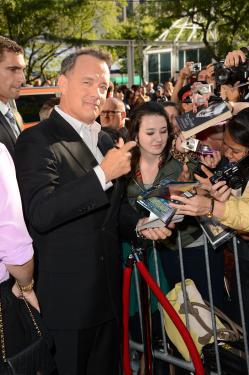In Cloud Atlas, the literary adaptation directed by Tom Tykwer and the Wachsowski siblings which opens this Friday, Tom Hanks plays five major roles: a 19th-century English doctor, a 1930s English hotelier, an American nuclear scientist in the 1970s, a thuggish British writer in 2012, and a tribesman of indeterminate background sometime in the very distant future. (He also has a cameo of sorts as a probably British actor in the 22nd century.) It’s a daring, ambitious feat. And it fails spectacularly.
Why? For all his considerable skill, Tom Hanks simply isn’t the kind of shape-shifter who could pull off something like that. So why cast him then? The reason is obvious: He is the “ultimate Everyman of our age,” to quote the film’s directors. “Our Jimmy Stewart,” as Lana Wachowski says, echoing hundreds of people before her. Therein lies the problem: Tom Hanks is not an “Everyman,” and neither was Jimmy Stewart. What they both are is affable, handsome-but-not-too-handsome heterosexual American white guys with middle class backgrounds and largely British ancestors who generally portray good guys in the movies. (Stewart’s parents were of Scottish descent; Hanks’s mother had Portuguese ancestors, but his father’s side was mostly British.)
That is a very specific thing! And it is no coincidence, of course, that these are the sorts of men that the word “Everyman” typically follows around. The term dates to a time and place where anyone who was not a straight, white (and arguably even British) man was explicitly regarded by law and social norms as inferior to those who were. Its earliest known use is in the 15th-century English morality play The Somonyng of Everyman, which depicts the path of an allegorical figure toward salvation through Christ.
It’s true that the term broadened somewhat during the last several decades: Denzel Washington, for instance, is occasionally referred to (and cast) as an “Everyman,” even though he’s black and exceptionally handsome. More typical, though, is the Newsweek piece from last year in which Steve Carrell is described as the “new” Everyman, someone “in that Tom Hanks, Jimmy Stewart, Jack Lemmon category.” Gay men almost never get the label—and the clunky term “everywoman” has never really caught on. (The idea of being “every woman,” as popularized by Chaka Khan, is a distinct notion, which involves the ability to “cast a spell,” “mix a special brew,” and “put fire inside of you”—hardly ordinary traits. Another related but ultimately quite different notion is the idea of being “everyday people”—note the inclusive, gender-neutral plural.)
The whole concept of the Everyman is a pernicious one, however well intended. It perpetuates bogus received ideas about what sorts of characters are “relatable,” and, more broadly, who is “normal” and who is not. It’s long past time for the term to be dropped into history’s dustbin and left there.
